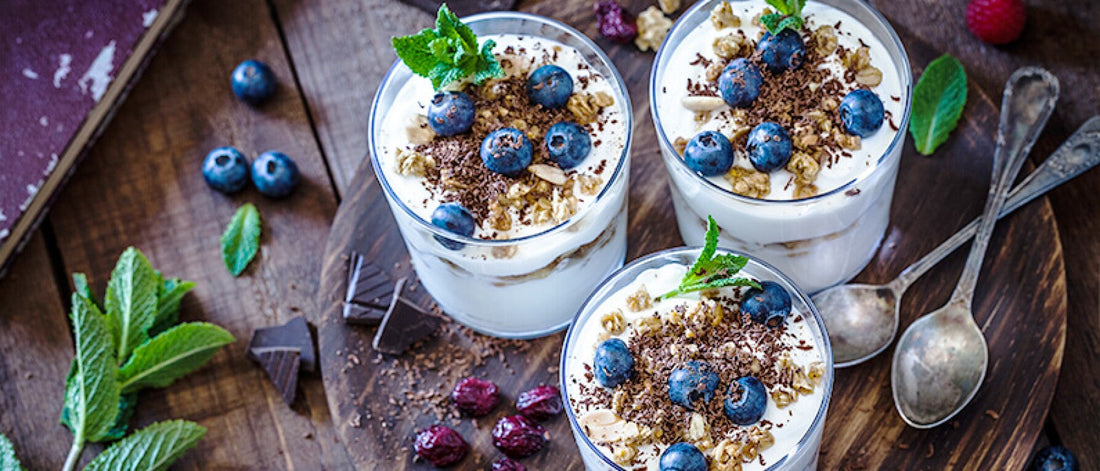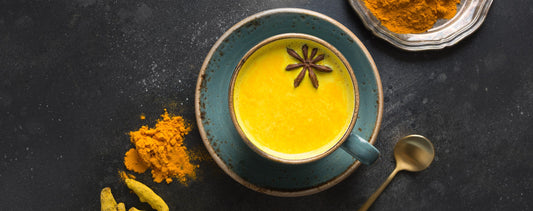Probiotics is a word that you’ve likely heard—whether your friend at the gym told you about her kombucha drink that has probiotics or you saw an advertisement on TV trying to sell you on a probiotic supplement. When you read any article related to gut health, probiotics are usually the main focus and for good reason. Probiotics have been proven to have many beneficial health benefits. But it’s not enough to know they’re good for you. Understanding what probiotics are, what they do for the body, and how to consume them is important. Educating yourself is the most important thing you can do for your health! So let’s chat about probiotics.
Let’s get down to it—what are the benefits of probiotics and what can they do for your body?
One of the ways probiotics are beneficial is that they reduce inflammation. Probiotics have been shown to block pro-inflammatory responses by the immune system that can trigger chronic inflammation over time, which means they can help reduce the symptoms of inflammatory conditions like Crohn’s disease and ulcerative colitis. In the case of gut infections like H. pylori, probiotics are shown to be effective in treating the infection as an alternative to antibiotics.
For digestive health as a whole, probiotics are shown to be beneficial for many different gastrointestinal diseases. However, the type of strain of probiotic matters for different conditions. (More on that later in the section about probiotic supplements.)
Let’s first begin to understand the immune system. Your immune system has two responses: innate immunity and adaptive immunity. Innate immunity is the immediate inflammatory response that your body has to protect itself from a “foreign invader,” whether it’s a harmful bacteria or an allergic response to an allergen. Then there is adaptive immunity, which isn’t immediate but takes 7–10 days to come into effect. Adaptive immunity brings out the specific response to protect and attack whatever is harmful to the body. It adapts to what is needed!
So how do probiotics benefit immunity? Since 80 percent of your immune system is in your gut, that means the immune cells that produce antibodies and the beneficial bacteria are all a part of that system. So when you consume probiotics, you are arming your gut with more beneficial bacteria to fight off the harmful bacteria like E. coli, but it’s also helpful for basic infections of the respiratory tract, like the common cold. In one study, probiotics proved to be effective in reducing the amount of time it took children and adults to recover from colds. Imagine being able to reduce the amount of time you’re sick so you don’t have to miss work or school. All just by taking a probiotic!
Think about probiotics being a catalyst for your immune system and a way to “crowd out” the harmful bacteria in your gut. The more good bacteria (probiotics) you have in your body, the greater their ability to overtake the bad bacteria that cause infections. Probiotics are shown to improve innate immunity, which is significant because that’s the first responder of your immune system to protect itself.
Yogurt was historically recommended as a dietary intervention and administered vaginally to provide Lactobacilli to balance the environment inside the vagina. There is little evidence to prove that strategy’s effectiveness, but this study showed that supplementing with probiotics, specifically Lactobacilli strains, was helpful in targeting disorders of the female urogenital tract, such as bacterial vaginosis and yeast infections.
So if you’re a woman and you often experience infections or want to maintain vaginal health, Lactobacillus-based probiotics are a great way to naturally keep yourself healthy.
Another study involving pregnant women showed great results in reducing the risk of eczema in children. In this study, the mothers were administered probiotics prenatally and postnatally. There was an 83 percent lower risk of their children developing eczema in the first two years of life.
Skin conditions like eczema and acne are inflammatory conditions. Probiotics have been shown to have anti-inflammatory properties and reduce pro-inflammatory cytokines that are responsible for chronic inflammation over time. Probiotics may help reduce inflammation and prevent problems from becoming chronic.
In another study that examined petrochemical workers, it was shown that consuming probiotic yogurt and a probiotic supplement had beneficial effects on measures of mental health, including depression and stress. Another study showed that taking probiotics can be helpful for reducing negative thoughts when someone is experiencing sadness. It’s clear that probiotics in food and supplements have promising effects on mental health, but further studies are needed to solidify the results.
Also pay attention to quality when picking a probiotic. Because probiotics have to go through your stomach to get to your intestinal tract, having a tested probiotic that can survive the acidic environment of your stomach acid is important. There are also different levels of probiotics depending upon your budget. A reasonably priced store-bought probiotic you can find is PB8. At the other end of the spectrum, you have to go through a health practitioner to get MegaSpore Biotic, which is a higher quality and more effective probiotic. Probiotic supplements also come in different forms: capsules, tablets, powders, etc. Consult your doctor to advise on the type and quality of probiotic that is best for your health needs.
Another option to consider is prebiotics—food components that help promote good bacteria and fungi. Prebiotics are found in fiber-rich foods and they are important because prebiotics feed probiotics. When you consume prebiotics in foods, it promotes good bacteria in your gut, so it’s just another way to make sure you’re maintaining gut health through food.
Whenever you can enjoy a probiotic-rich food, go for it! Top your salads or sandwiches with sauerkraut, enjoy a bowl of yogurt with berries (for prebiotics), or sip on a glass of kombucha.
Now that you know everything there is to know about the benefits of probiotics, it’s time to start implementing that knowledge! Consult your doctor for the type of probiotic you should consume, as well as the quality, and the quantity.
*Editor’s Note: The information in this article is intended for your educational use only; does not necessarily reflect the opinions of the Chopra Center's Mind-Body Medical Group; and is not a substitute for professional medical advice, diagnosis, or treatment. Always seek the advice of your physician or other qualified health providers with any questions you may have regarding a medical condition and before undertaking any diet, supplement, fitness, or other health program.
Discover Deepak Chopra’s secrets to stay energetic and balanced all year long with our self-paced online course, Secrets to Vibrant Health. Learn More.
What Are Probiotics?
Probiotics are live microorganisms that offer health benefits when consumed. Probiotics are, in most cases, a kind of bacteria, but fermented yeast can also function as a probiotic. The word probiotic comes from “pro biota,” which means “for life.” If you think about it, probiotics are necessary for every living organism! And they occur naturally in the microbiome of humans, aka the gut!Let’s get down to it—what are the benefits of probiotics and what can they do for your body?
Benefits of Probiotics
1. Digestive Health
Digestive health is a general term, so let’s dig deeper. Digestive health is more than avoiding gas and bloating. Those are just symptoms of something deeper going on. When you hear that probiotics benefit digestive health, think gut infections like H. pylori or conditions such as Crohn’s disease and ulcerative colitis.One of the ways probiotics are beneficial is that they reduce inflammation. Probiotics have been shown to block pro-inflammatory responses by the immune system that can trigger chronic inflammation over time, which means they can help reduce the symptoms of inflammatory conditions like Crohn’s disease and ulcerative colitis. In the case of gut infections like H. pylori, probiotics are shown to be effective in treating the infection as an alternative to antibiotics.
For digestive health as a whole, probiotics are shown to be beneficial for many different gastrointestinal diseases. However, the type of strain of probiotic matters for different conditions. (More on that later in the section about probiotic supplements.)
2. Immunity
Did you know that the majority of your immune system resides in your gut? In fact, about 80 percent of your immune cells live in your gastrointestinal system. That’s a whopping amount! If 80 percent of your body’s ability to fight infections is dependent upon your gut, then it makes sense why probiotics can be important for immunity.Let’s first begin to understand the immune system. Your immune system has two responses: innate immunity and adaptive immunity. Innate immunity is the immediate inflammatory response that your body has to protect itself from a “foreign invader,” whether it’s a harmful bacteria or an allergic response to an allergen. Then there is adaptive immunity, which isn’t immediate but takes 7–10 days to come into effect. Adaptive immunity brings out the specific response to protect and attack whatever is harmful to the body. It adapts to what is needed!
So how do probiotics benefit immunity? Since 80 percent of your immune system is in your gut, that means the immune cells that produce antibodies and the beneficial bacteria are all a part of that system. So when you consume probiotics, you are arming your gut with more beneficial bacteria to fight off the harmful bacteria like E. coli, but it’s also helpful for basic infections of the respiratory tract, like the common cold. In one study, probiotics proved to be effective in reducing the amount of time it took children and adults to recover from colds. Imagine being able to reduce the amount of time you’re sick so you don’t have to miss work or school. All just by taking a probiotic!
Think about probiotics being a catalyst for your immune system and a way to “crowd out” the harmful bacteria in your gut. The more good bacteria (probiotics) you have in your body, the greater their ability to overtake the bad bacteria that cause infections. Probiotics are shown to improve innate immunity, which is significant because that’s the first responder of your immune system to protect itself.
3. Vaginal Health
The vagina is similar to the intestinal tract in the sense that it is an ecosystem of bacteria that must be balanced to maintain health. The main strain of bacteria, Lactobacilli, that is found in the vagina makes the area acidic so that harmful microorganisms cannot survive. However, because such a delicate balance of bacteria is needed to maintain homeostasis in the vagina, it gets thrown off by outside factors such as birth control pills, spermicides, and even antibiotics. When the vaginal microflora is out of balance, conditions like yeast infections, urinary tract infections, and bacterial vaginosis can develop. Probiotics help keep the ecosystem of the vagina in balance to maintain the acidic environment to prevent infections.Yogurt was historically recommended as a dietary intervention and administered vaginally to provide Lactobacilli to balance the environment inside the vagina. There is little evidence to prove that strategy’s effectiveness, but this study showed that supplementing with probiotics, specifically Lactobacilli strains, was helpful in targeting disorders of the female urogenital tract, such as bacterial vaginosis and yeast infections.
So if you’re a woman and you often experience infections or want to maintain vaginal health, Lactobacillus-based probiotics are a great way to naturally keep yourself healthy.
4. Skin Conditions
Although the evidence isn’t yet conclusive, there are promising studies that show probiotics benefit skin health and dermatological conditions. This study showed that probiotics had promising effects on the reduction of atopic eczema in infants by reducing inflammation.Another study involving pregnant women showed great results in reducing the risk of eczema in children. In this study, the mothers were administered probiotics prenatally and postnatally. There was an 83 percent lower risk of their children developing eczema in the first two years of life.
Skin conditions like eczema and acne are inflammatory conditions. Probiotics have been shown to have anti-inflammatory properties and reduce pro-inflammatory cytokines that are responsible for chronic inflammation over time. Probiotics may help reduce inflammation and prevent problems from becoming chronic.
5. Mental Health
Have you heard of the gut-brain connection? It’s a proven connection in the body; those “gut feelings” you get aren’t just a feeling. It’s an actual physical response that happens between your brain and your gut. So if your brain and your gut are connected on a physical level, it makes sense that your microbiome and probiotics affect mental health. Stress and disorders like anxiety and depression are all impacted by consuming probiotics. In this review of different studies on mental health and probiotics in animals and humans, it was shown that consuming two strains of probiotics (Bifidobacterium and Lactobacillus) for 1–2 months was enough to improve symptoms of obsessive-compulsive disorder, anxiety, depression, and memory problems.In another study that examined petrochemical workers, it was shown that consuming probiotic yogurt and a probiotic supplement had beneficial effects on measures of mental health, including depression and stress. Another study showed that taking probiotics can be helpful for reducing negative thoughts when someone is experiencing sadness. It’s clear that probiotics in food and supplements have promising effects on mental health, but further studies are needed to solidify the results.
How to Get Your Probiotics
Now that you know the benefits of probiotics and how they can improve your health, what do you do? Start consuming them! There are a couple of different ways to get probiotics into your diet.1. Probiotic Supplements
This is the most obvious way to consume probiotics, but not all probiotics are considered equal. And remember that the type of probiotic strain matters. Different strains fight different bacteria or yeasts. For example, in the case of vaginal health, the strain Lactobacilli is particularly important. The best way to know which probiotic is helpful for the condition you are experiencing is to reach out to your doctor. They can recommend a probiotic that is safe for you and most beneficial for what you need help with.Also pay attention to quality when picking a probiotic. Because probiotics have to go through your stomach to get to your intestinal tract, having a tested probiotic that can survive the acidic environment of your stomach acid is important. There are also different levels of probiotics depending upon your budget. A reasonably priced store-bought probiotic you can find is PB8. At the other end of the spectrum, you have to go through a health practitioner to get MegaSpore Biotic, which is a higher quality and more effective probiotic. Probiotic supplements also come in different forms: capsules, tablets, powders, etc. Consult your doctor to advise on the type and quality of probiotic that is best for your health needs.
2. Fermented Foods
To naturally get probiotics in your diet, fermented foods are the best way. Yogurts and milk drinks like kefir have probiotics. You can also find probiotics in plant-based foods like pickled vegetables—think sauerkraut and kimchi. Probiotics can also be found in fermented soy like tempeh, miso, and tamari. Kombucha is another option and becoming increasingly popular.Another option to consider is prebiotics—food components that help promote good bacteria and fungi. Prebiotics are found in fiber-rich foods and they are important because prebiotics feed probiotics. When you consume prebiotics in foods, it promotes good bacteria in your gut, so it’s just another way to make sure you’re maintaining gut health through food.
Whenever you can enjoy a probiotic-rich food, go for it! Top your salads or sandwiches with sauerkraut, enjoy a bowl of yogurt with berries (for prebiotics), or sip on a glass of kombucha.
Now that you know everything there is to know about the benefits of probiotics, it’s time to start implementing that knowledge! Consult your doctor for the type of probiotic you should consume, as well as the quality, and the quantity.
*Editor’s Note: The information in this article is intended for your educational use only; does not necessarily reflect the opinions of the Chopra Center's Mind-Body Medical Group; and is not a substitute for professional medical advice, diagnosis, or treatment. Always seek the advice of your physician or other qualified health providers with any questions you may have regarding a medical condition and before undertaking any diet, supplement, fitness, or other health program.
Discover Deepak Chopra’s secrets to stay energetic and balanced all year long with our self-paced online course, Secrets to Vibrant Health. Learn More.






















